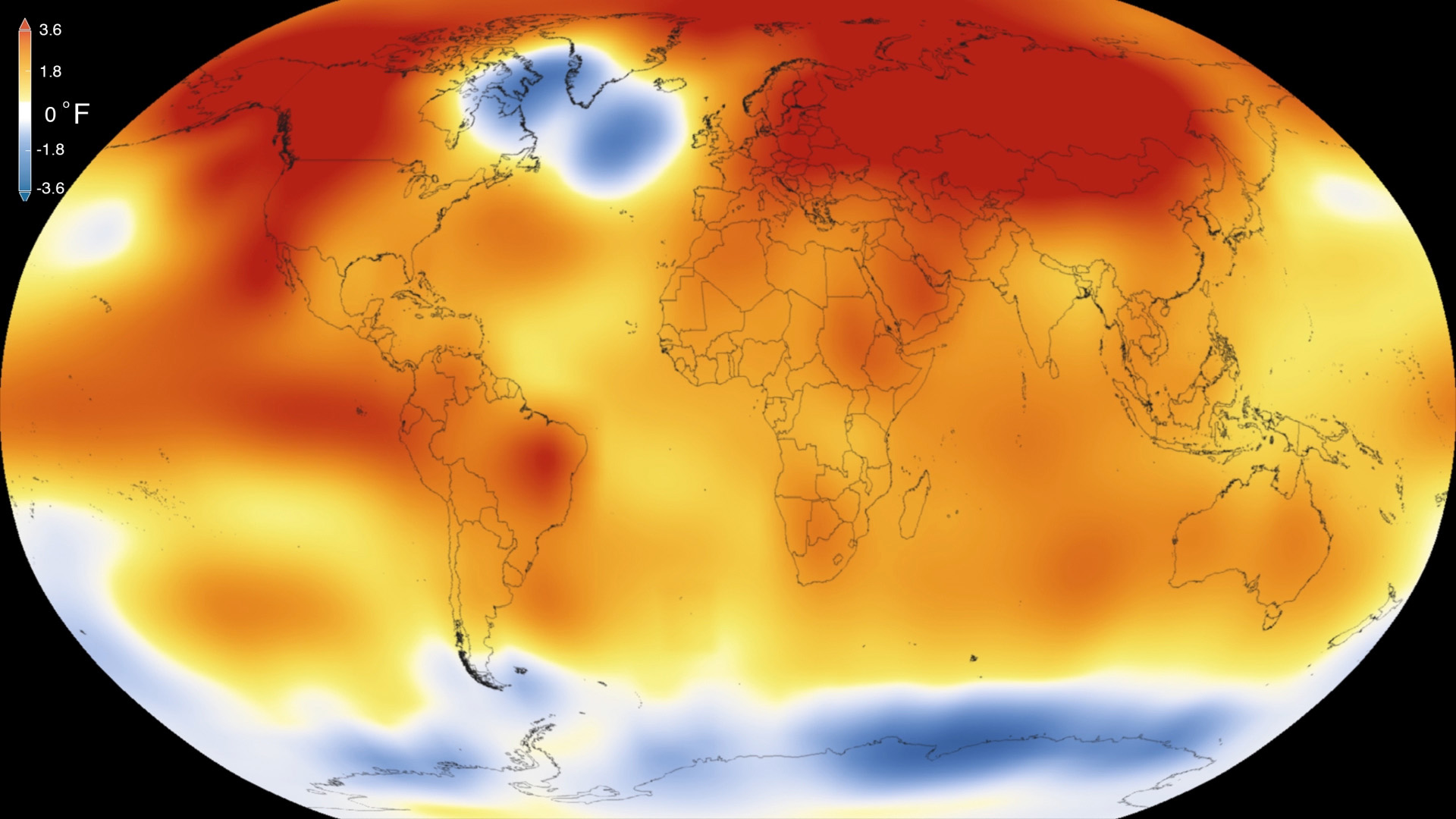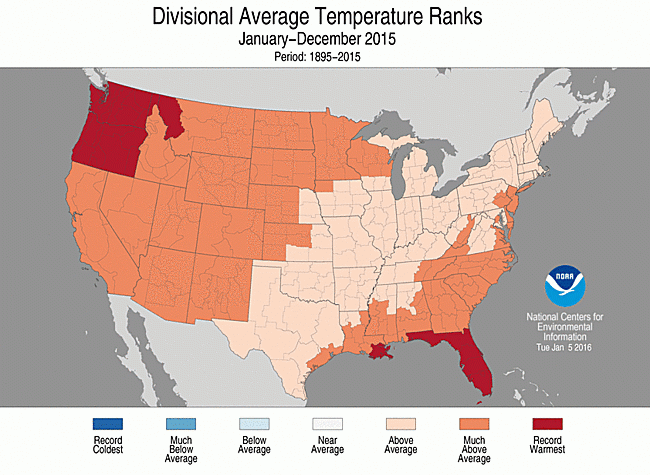From two years ago, and still relevant (and still NSFW funny):
The official temperature at O'Hare got up to 15°C this afternoon, which you'd expect in early April and not in mid-February. That's the good news. The bad news is the warm air mass is being driven by converging jet streams more or less directly over Chicago, giving us 67 km/h winds gusting to—I am not making this up—100 km/h. Buildings in the Loop are being evacuated because windows are popping out. Also, people are giving cranes wide berths.
Have I mentioned that anthropogenic climate change will (a) be pretty good for Chicago, for a few decades anyway, and (b) pump more energy into the atmosphere causing these kinds of wind events?
Even though the U.S. only had its second-hottest year on record, NASA and NOAA reported today that worldwide temperatures were the hottest since records began in 1880:
Globally-averaged temperatures in 2015 shattered the previous mark set in 2014 by 0.23 degrees Fahrenheit (0.13 Celsius). Only once before, in 1998, has the new record been greater than the old record by this much.
The planet’s average surface temperature has risen about 1.8 degrees Fahrenheit (1.0 degree Celsius) since the late-19th century, a change largely driven by increased carbon dioxide and other human-made emissions into the atmosphere.
Most of the warming occurred in the past 35 years, with 15 of the 16 warmest years on record occurring since 2001. Last year was the first time the global average temperatures were 1 degree Celsius or more above the 1880-1899 average.
The Times analysis:
Politicians attempting to claim that greenhouse gases are not a problem seized on that slow period to argue that “global warming stopped in 1998” and similar statements, with these claims reappearing recently on the Republican presidential campaign trail.
Statistical analysis suggested all along that the claims were false, and the slowdown was, at most, a minor blip in an inexorable trend, perhaps caused by a temporary increase in the absorption of heat by the Pacific Ocean.
“Is there any evidence for a pause in the long-term global warming rate?” said Gavin A. Schmidt, head of NASA’s climate-science unit, the Goddard Institute for Space Studies, in Manhattan. “The answer is no. That was true before last year, but it’s much more obvious now.”
How was the U.S. not hottest-ever last year? If you look at NASA's map, you can see why. Almost the entire world was significantly hotter than normal, except for the Antarctic Circle, bits of the North Atlantic, and the eastern U.S.:

They've even got a nifty video showing the progression over time:
Via the Illinois State Climatologist, NOAA reported this week that 2015 was extraordinarily warm:
The 2015 annual average U.S. temperature was 12.4°C, 1.3°C above the 20th century average, the second warmest year on record. Only 2012 was warmer for the U.S. with an average temperature of 12.9°C. This is the 19th consecutive year the annual average temperature exceeded the 20th century average.
(Emphasis mine.)
Moreover, in 2015, every part of the lower 48 states had above-average temperatures:

Nineteen consecutive years of above-average temperatures. Yes, that does mean they'll change the averages soon. But they've already done once in the past 19 years, since normal temperatures are based on moving 30-year data sets. (Current normals are based on the period 1981-2010.)
The Earth has global cool periods periodically, the last one ending around 10,000 years ago, which gave us humans the push we needed to invent complex civilizations. Even though global temperatures were higher about 8,000 years ago than they are today, they were dropping gradually until about 200 years ago. (Any guesses why?)
In short, we're due for another glaciation. But it looks like that won't happen:
[S]cientists of the Potsdam Institute for Climate Impact Research found that the relation of insolation and CO2 concentration in the atmosphere explains the last eight glacial cycles in Earth history. At the same time, their results illustrate that even moderate human interference with the planet's natural carbon balance might postpone the next glacial inception by 100,000 years.
"Even without man-made climate change, we would expect the beginning of a new ice age no earlier than in 50,000 years from now—which makes the Holocene as the present geological epoch an unusually long period between ice ages," explains lead author Andrey Ganopolski. "However, our study also shows that relatively moderate additional anthropogenic CO2 emissions from burning oil, coal and gas are already sufficient to postpone the next ice age for another 50,000 years. The bottom line is that we are basically skipping a whole glacial cycle, which is unprecedented. It is mind-boggling that humankind is able to interfere with a mechanism that shaped the world as we know it."
Yes, we've probably prevented another ice age, even as we've killed off more species than any other force in the last 66 million years.
And if anyone tells me that tomorrow night's -19°C low temperature somehow means we're not warming the planet on our own, I will become verbally violent.
Yesterday, Chicago got up to 15°C, not a record but also not what one would expect in December. Our forecast for the next week has the temperature drifting just below freezing Sunday night but otherwise staying above 0°C, which feels a lot more like late March than New Year's Eve.
It's a little unnerving. Don't forget, warm winter means warm lake means warm summer—even without the driving force of El Niño, which may not dissipate before June.
Not that I'm complaining. I'm just...nervous.
Two more things in the news.
First: Over the weekend more than 200 countries (including the U.S.) signed what could be an historic treaty to reduce climate-changing pollution in hopes of keeping the damage manageable. Even Krugman is optimistic about the deal. We'll see.
Second: combine the over-militarization of local police with internet trolls, and you get "swatting." Perhaps we want to re-think our slide into a police state after all?
Back to waiting for the cable guy...
Officially at O'Hare right now it's 15.6°C, down slightly from the 16.1°C recorded earlier. My car says it's 17.5°C. These temperatures would be normal for late April or mid-October.
The forecast calls for temperatures to drop to a more-normal -1°C by next weekend, but after that the CPC forecast calls for a 75-90% probability of above-normal temperatures through March.
Keep in mind, warm winters in Chicago often lead to warm summers, because the lake can't dissipate as much heat as it does in a cold winter. And as we're seeing this year, summer temperatures have little influence on winter temperatures here. So while we're all excited about a warm winter, we need to keep in mind that next summer could be brutal.
Forecasters predicted that this year's El Niño would lead to a warm winter, but they weren't really sure. It looks like it will.
Stuff to read (or watch):
Back to the mines.
I'm totally swamped today, so here are the things I haven't read yet:
Twenty minutes until my next meeting.